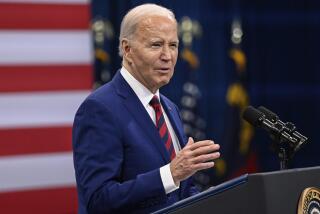Bernie Sanders declares victory in muddled Iowa caucuses

As the vote counting meltdown continued in Iowa on Thursday, Bernie Sanders decided he was done waiting and declared victory.
The announcement, at a rare afternoon news conference, came days after former South Bend, Ind., Mayor Pete Buttigieg made the same declaration for himself Monday after the caucuses.
The two men are in a near dead heat in delegates earned as results continue to trickle in and will now be reassessed by party officials. Sanders argued that what does not seem to be in dispute is who won the popular vote. The Vermont senator was the first choice for 6,000 more Iowa voters than Buttigieg, according to the party’s latest count.
“What certainly is not going to change is the fact that in terms of the popular vote, we won a decisive victory,” Sanders said. “Some 6,000 more Iowans came out on caucus night to support our candidacy than the candidacy of anyone else. And when 6,000 more people come out for you in an election than your nearest opponent, we here in northern New England call that a victory.”
Sanders acknowledged the final results could end up with Buttigieg being awarded a few more “delegate equivalents” — a traditional measure used to judge the victor of the caucus under its rules. But he said those won’t be a factor when it comes to choosing the nominee, and that both men will have the same number of delegates at the Democratic convention in the summer.
“This difference, no matter who inches ahead in the end, is meaningless,” Sanders said of the delegate equivalents. “We are both likely to receive the same number of national delegates to the Democratic National Convention in Milwaukee. I think right now it is about 11 each. It will probably go up a bit. Those national delegates, not the state delegates, are the ones that really matter in the nominating process.”
Software malfunctions, the jamming of the Iowa Democratic Party’s hotline for reporting results and a variety of tabulation errors have marred the vote count. The party did not release any results until Tuesday. The senator expressed deep frustration with the chaos in Iowa.
“What has happened with the Iowa Democratic Party is an outrage,” he said. “That they would be that unprepared, that they put forth such a complicated process, relied on untested technology, and also to be honest with you, they have relied on thousands of volunteers, good people, who get up and go to work the next day, to do what is enormously complicated.”
Sanders was asked how voters are supposed to reconcile his declaration of victory after Buttigieg announced himself the winner earlier this week.
“Because I got 6,000 more votes,” he said. “And from where I come, when you get 6,000 more votes, that’s generally regarded to be the winner.”
The disappointment with the Iowa party also stirred up resentment from Sanders supporters of his 2016 presidential campaign, when the senator was just slightly edged out in the state by rival Hillary Clinton. Sanders supporters took issue with how delegates were awarded and the lack of transparency in the process. The party addressed some of those concerns by agreeing to disclose the results of the popular vote at caucuses this cycle.
“The fact that we now have clear results of the popular vote is something that we fought for,” Sanders said. “That did not exist in 2016. Now, I can’t give you with definitive answers as to what happened in 2016. I don’t know. I don’t think anybody knows.”
More to Read
Get the L.A. Times Politics newsletter
Deeply reported insights into legislation, politics and policy from Sacramento, Washington and beyond. In your inbox three times per week.
You may occasionally receive promotional content from the Los Angeles Times.







